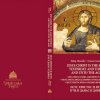His screenplays have been finalists at Sundance Writers Lab and Tribeca All-Access program. He often collaborates with his brother Branislav. Their latest collaboration, a feature film “Love Hunter” premiered at the prestigious Warsaw Film Festival and was “among its highlights”, according to The Hollywood Reporter. It opened in New York on November 14, 2014 and was among New York Times Critics’ Pick of the week. New York Times called it "at once fantastical and gritty… one of the most refreshing New York independent films." “Love Hunter” was invited to screen at the prestigious Gene Siskel Film Center in Chicago. Kino Lorber, esteemed distribution company, added the film to its catalogue.
Sidebar
Site Map
A great man is one who collects knowledge the way a bee collects honey and uses it to help people overcome the difficulties they endure - hunger, ignorance and disease!
- Nikola Tesla
Remember, remember always, that all of us, and you and I especially, are descended from immigrants and revolutionists.
- Franklin Roosevelt
While their territory has been devastated and their homes despoiled, the spirit of the Serbian people has not been broken.
- Woodrow Wilson





